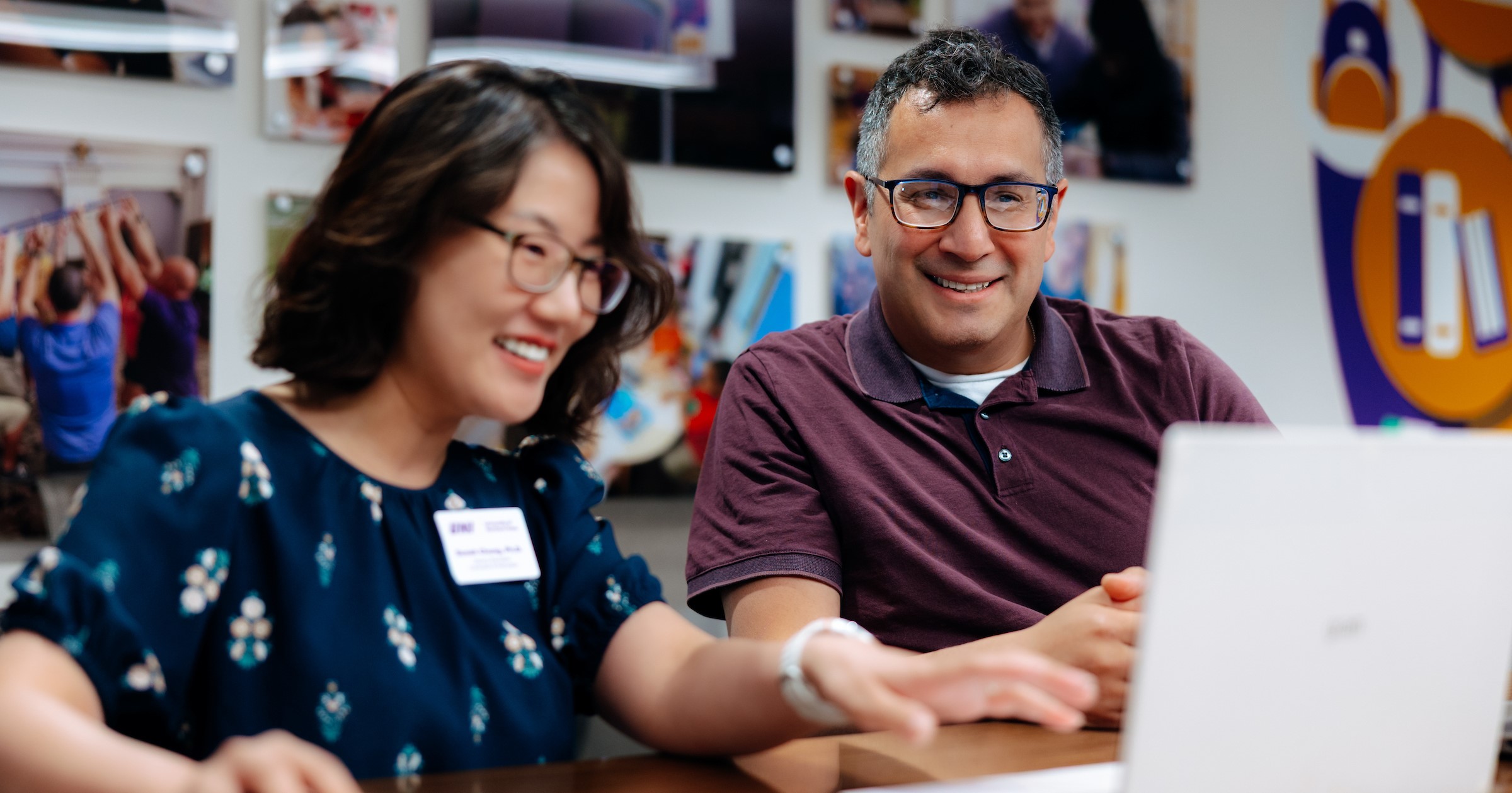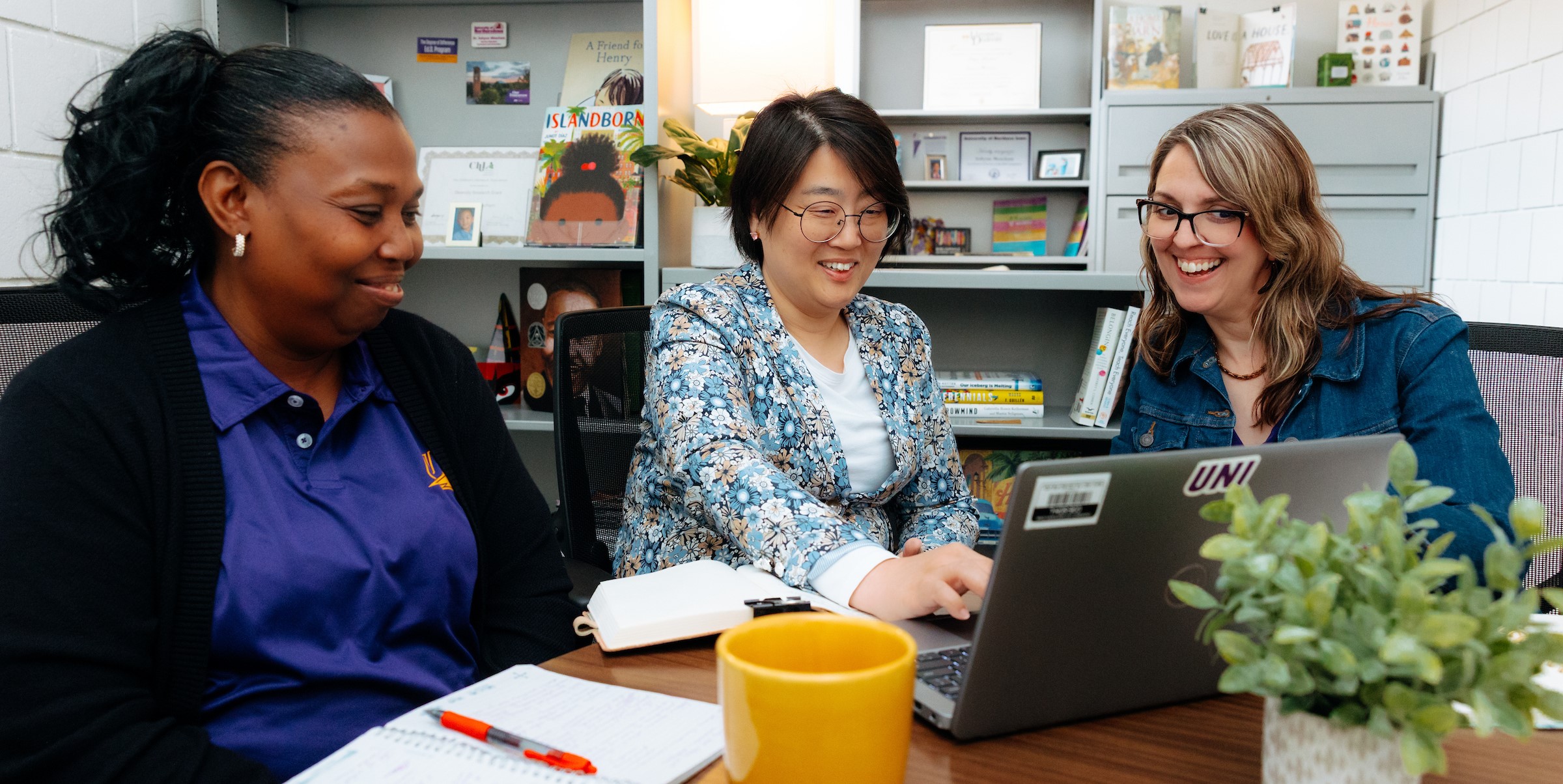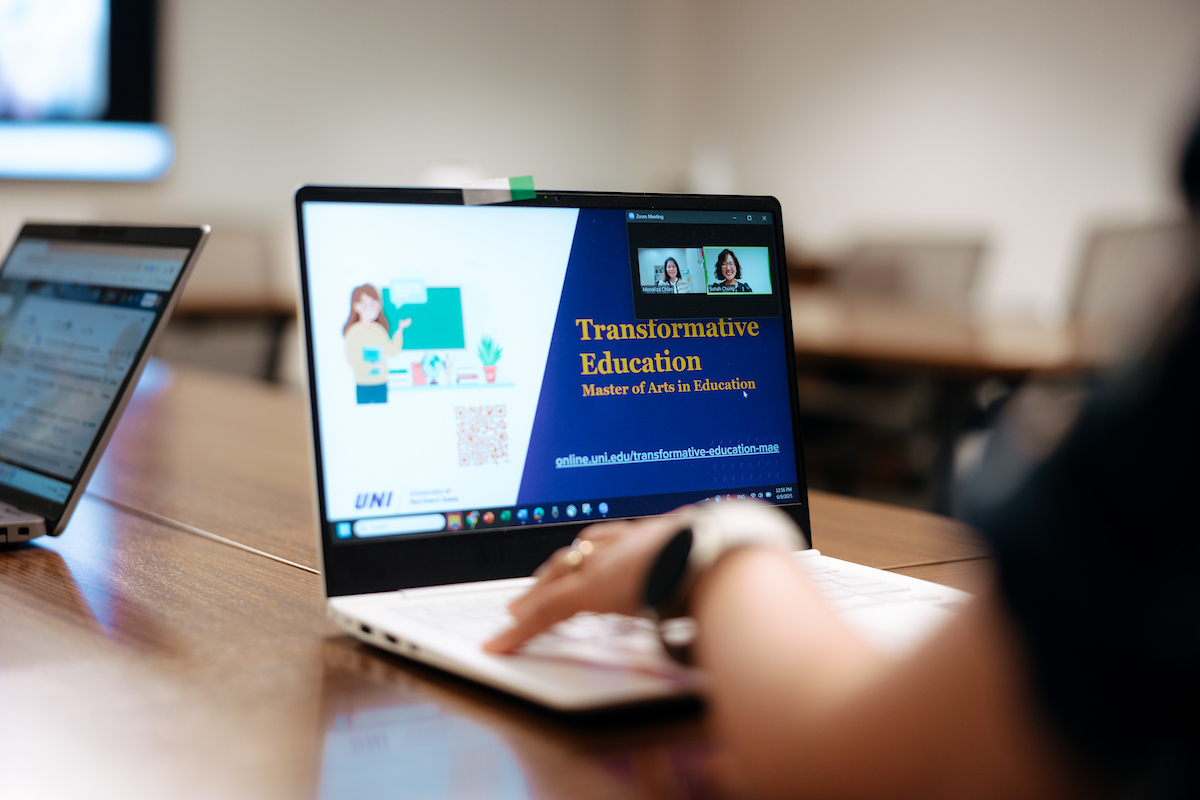Graduate Education on the Rise
Graduate Education on the Rise

As the new academic year unfolds, working professionals and adult learners have more options than ever to advance their careers, knowledge and expertise at the University of Northern Iowa.
What’s driving this growth in the College of Education?
For one, all but two of its graduate programs — including those in principalship, superintendency and the new Master of Arts in Teaching (MAT) in secondary education — are now fully or mostly online. The proportion and number of online programs within the curriculum represent a shift that attracts today’s adult learners — many placebound, working professionals who seek, even demand, such flexibility.
Another change: more graduate programs now operate on an annual admissions cycle. Some now even admit students every term. Previously, most programs operated in a cohort model and admitted students every other year.
The tremendous growth in the Doctor of Education (EdD) program reflects these new directions. Between a transition to a mostly online program five years ago and a move to annual enrollment, its numbers have risen dramatically. Ninety-eight students were enrolled last spring, up from a typical annual average of about 30. This boost supports overall growth and stability within the college. The college also boasted 385 graduate students overall, a point of pride, with a record-setting 30 EdD graduates being hooded on the commencement stage in May.
A new office to recruit and retain

Supporting this change is a new Office of Graduate Studies and Research, led by Associate Dean Soh Meacham. For recruitment, it complements and supplements the efforts of partners in UNI’s online education office, part of the College of Graduate, Research and Online Education, who assist the college in online-based recruitment, matriculation and enrollment. The new office coordinates a centralized approach within the College of Education to engage with prospective students for both residential and online programs.
“We’re really focused on the adult learner and making sure that when they reach out to our office, they’re getting timely, responsive, accurate communication that helps them in a more personalized way,” says Cheryl Meller, graduate recruitment and event coordinator.
Part of the office’s mission is to remove barriers that prevent students from earning advanced degrees at UNI. From the initial stages of research to program completion, faculty and staff work to ensure a seamless experience.
“We really pride ourselves on the education and experience students get in the College of Education,” Meller says. “A lot of the work outside of recruitment has focused on that experience, like what we can do to make the admissions process simpler.”
For example, must a letter of recommendation always come from a former professor? For students who earned their undergraduate degrees 15 years ago, those relationships may no longer exist. The office is evaluating such requirements to ensure prospective students feel welcomed from the start.
For current students, the office is also reimagining final project requirements to expand opportunities for scholarly and professional contributions. While traditional dissertations and thesis projects remain valued options, capstone or culminating projects may serve as an alternative. The team continues to explore options that better align with the skills students will need in their post-graduate contexts.
“We really celebrate our team endeavor in terms of providing our students with what they really need,” says Meacham.
Another key area of focus is enhancing quality mentoring by promoting more guided advising from faculty members.
“We believe mentoring is related to recruitment,” says Meacham. “Providing meaningful experiences to our students increases the pool for our prospective students.”
This work matters deeply, as Iowa needs more teachers and education professionals with advanced education.
“We can’t forget that the end result is somebody who goes into the school system, higher education or other organizations and impacts lives,” says Meller. “That’s an important cherry on the top — not only seeing what they do here at UNI, but also what they do once they leave the walls of our institution.”
New programs, new pathways
The growth in graduate education is also driven by new program offerings. Recently, the college introduced a new Master of Arts (MA) program in instructional design and learning technologies, aimed at serving instructional designers working in corporate and industry settings. Updated master’s programs in early childhood education, literacy education and school library studies are also in development.
Additionally, new graduate certificate programs in special education, literacy education and early childhood education became available this year. Most of these programs support in-service teachers seeking new endorsements.
With another new graduate certificate, UNI became one of the first in the nation to offer coursework specific to artificial intelligence in education. An additional bonus: this is one of a set of new stackable graduate certificates which can help complete a new Master of Arts in Education (MAE) in transformative education (see sidebar).
Robin Dada, head of the Department of Elementary and Middle Level Education, believes all of these efforts make the future of graduate education bright.
“As we continue to develop models to deliver educational opportunities to more people in Iowa and beyond, more of Iowa’s workforce has access to graduate education, growing new skills for their professions, careers and vocations that will make a difference to the Iowa economy and quality of life in Iowa,” she says.
Dada also notes that many students began a traditional college degree, but life circumstances prevented them from finishing on campus. Some gave up on higher education altogether.
“As higher education builds new pathways and develops new access to continuing education, new ways to deliver learning opportunities and support learners at a distance are born,” she says.
Some of those same students are now completing their degrees and stepping into new leadership roles in their communities, helping to improve the quality of life at the local level.
“It’s rewarding to see our graduates reaching their goals and ‘pushing the envelope’ as they break new boundaries and make opportunities come to life right where they are,” Dada adds.
Transformative education MAE offers access, flexibility
The new transformative education MAE is already making an impact. This stackable degree enables students pursuing additional endorsements, certificates or specializations to design a customized master’s program in consultation with their advisor.
Four core courses comprising the certificate are available every semester and fully online. Students can take these alongside — or before or after — their specialization courses, offering maximum flexibility to meet their career goals.
 One of the professors who helped develop the program is Sunah Chung, assistant professor of literacy education. “I’ve always believed in the power of education to spark personal and social change, and this program felt like an opportunity to bring that vision into a graduate context,” she says. “From the beginning, our faculty team engaged in some really thoughtful conversations about what transformative education looks like, not just for students, but for us as educators and lifelong learners.”
One of the professors who helped develop the program is Sunah Chung, assistant professor of literacy education. “I’ve always believed in the power of education to spark personal and social change, and this program felt like an opportunity to bring that vision into a graduate context,” she says. “From the beginning, our faculty team engaged in some really thoughtful conversations about what transformative education looks like, not just for students, but for us as educators and lifelong learners.”
Stackable credentials and asynchronous course formats ensure flexibility within the course design. This structure has made graduate study far more accessible for inservice teachers already managing demanding schedules. It has also expanded the program’s appeal to individuals who may not have otherwise considered graduate school.
One student currently enrolled is Jill Louzek, a student and a supervising teacher in the Marion Home School Assistance Program in Marion, Iowa. She is part of the program’s first cohort. Louzek was drawn to the program in part because it’s offered entirely online, and because she has long wanted to complete her master’s degree. Other institutions wouldn’t accept credits from the late 1990s – when she first began graduate studies – but UNI did as part of its “Return to UNI” program.
She’s had such a positive experience that she’s now encouraging others to consider the program, especially those who have put their degrees on hold due to life’s demands.
“Everyone is blown away that UNI is making this possible and meeting every need that I had,” Louzek says. “Transformative education is not just memorizing facts and spitting them back out, but learning and helping students become the future leaders we need them to be. It’s neat to see education turning around to see how we can best benefit students.”
Alum Andy Miehe: It all began with a flier
 Shortly after earning his bachelor’s degree in history teaching from UNI in 2001, Andy Miehe landed a social studies position at Waterloo East High School. One day, while in the mail room, he was about to toss a flyer for UNI’s educational leadership master’s program into the recycling bin.
Shortly after earning his bachelor’s degree in history teaching from UNI in 2001, Andy Miehe landed a social studies position at Waterloo East High School. One day, while in the mail room, he was about to toss a flyer for UNI’s educational leadership master’s program into the recycling bin.
“A veteran teacher stopped me and said, ‘Hey, what are you doing? You know you will never get any younger. You should look into it,’” Miehe recalls. “Crazy as that sounds, it was my start on the road to my master’s degree.”
He completed the degree in 2005 and became a department head, managed the summer school program, and served on the building leadership team at East — all within just a few years of starting his teaching career.
Miehe then moved into an assistant principal and athletic director role at Bunger Middle School in Evansdale and was later promoted to principal.
In the spring of 2015, while attending a conference as part of the Advanced Studies Certificate in superintendency he was working on at UNI, Miehe received a message: Waterloo West High School was beginning a search for a new head principal, and he was encouraged to apply.
“The stars seemed aligned at that point,” Miehe says. “I was finishing my superintendent’s endorsement, our kids were getting older, I had been at Bunger for nine years and felt ready for whatever was next, and I had graduated from West, so that seemed kind of cosmic.”
This year marks Miehe’s 10th year in that role.
Along the way, Miehe also chose to pursue his Doctor of Education (EdD) as a way to push himself professionally and expand his skill set and understanding of all things related to education.
“The highlights for me were the lifelong relationships I developed with the fellow EdD cohort students and the faculty at UNI,” Miehe says. “We all spent a lot of time together either in person or virtually, and we became like a little family supporting each other in our research, pushing each other academically and sharing ideas, advice and opportunities.”
Ultimately, Miehe knows he’s a more adept instructional leader and analytical thinker because of the EdD program.
“I am better at what I do and happier doing it with the skills and knowledge gained from the program,” he says. “I really do feel that my time at UNI has prepared me to be a lasting contributor to the education world in the Cedar Valley and beyond.”
New options in graduate education
Doctor of Education
- Interdisciplinary studies academic emphasis
Master’s Programs
- Master of Arts in Teaching (MAT) in secondary education for career changers interested in teaching in middle and high school classrooms
- Master of Arts in Education (MAE) in transformative education, for current educators seeking tools to lead change in their schools and communities through teaching methods, student engagement and problem-solving skills that enhance learning and drive improvement
- Master of Arts in instructional design and learning technologies, a revamped program to prepare instructional designers for settings ranging from corporations to schools to e-learning
Advanced Studies Certificate
- Director of Special Education
Micro-credentials
A new initiative overseen by the College of Graduate, Research and Online Education increases micro-credentialing options for educators. Online graduate-level endorsements and certificates offer flexibility for practicing teachers and professionals to add credentials — most of which can be stacked toward a master’s degree. New graduate certificate offerings now in place:
- Artificial Intelligence (AI) in Education*
- Childhood Diversity and Learning*
- Instructional Design*
- Learning Technologies*
- Online Teaching*
- Literacy Leadership Reading K-8*
- PK-K Early Childhood Special Education
- Special and Inclusive Education for Young Learners*
- Strategist I Mild/Moderate K-8*
- Strategist I Mild/Moderate Graduate Certificate 5-12*
- Strategist II Behavioral Disorder/ Learning Disability K-12*
- Strategist II Intellectual Disability K-12*
- Transformative Education*
*Qualify as stackable certificates
For more information, visit microcredentials.uni.edu.




